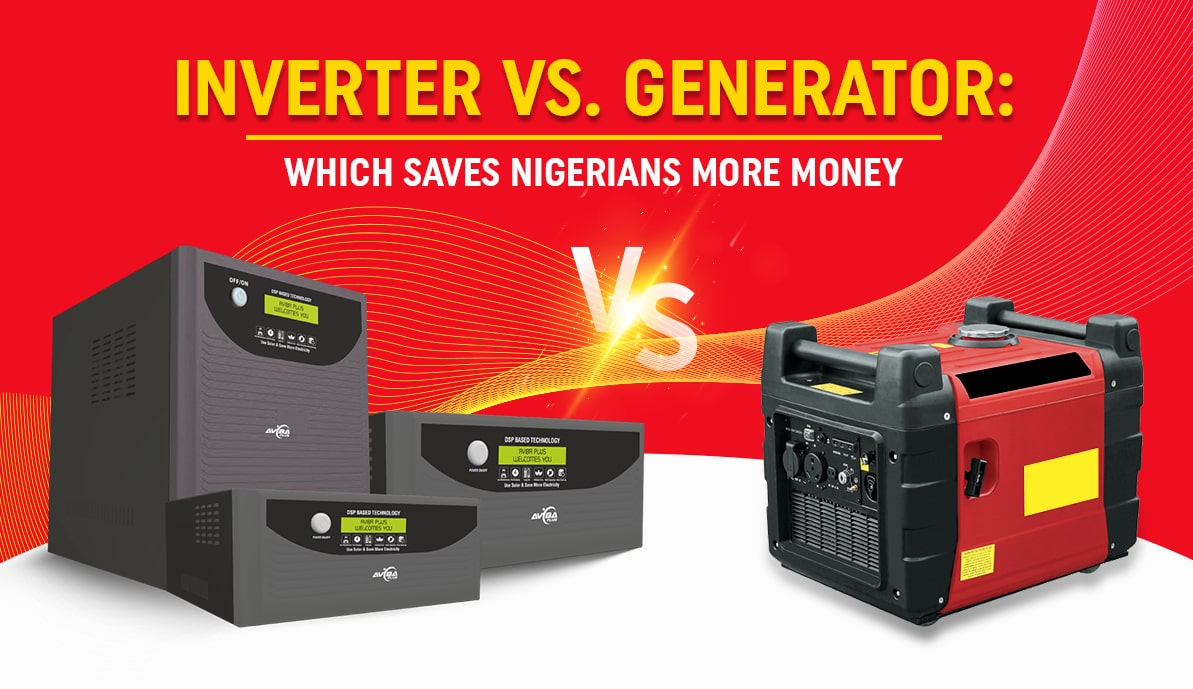Which is better? An inverter or a generator? This power-backup dilemma is quite common among Nigerians. Nigeria’s power supply challenges have made a power backup solution a necessity and not a luxury. Typically, generators are used for power-backup in Nigeria. However, for advanced, long-lasting power supply, inverters are mostly preferred.
Which one should you choose?
Check out this blog to check which of the two saves Nigerians more money. So that, you can receive a sustainable power backup every month.
Is inverter better than generator in Nigeria?
In Nigeria, power outages are frequent, so households often debate whether inverters or generators are more reliable. When comparing inverter vs generator cost, inverters tend to have a higher upfront price but lower long-term expenses. They are quieter, environmentally friendly, and require little maintenance compared to noisy, fuel-dependent generators.
Generators remain popular due to immediate affordability and higher power capacity for heavy appliances. However, with rising fuel prices, many Nigerians now see inverters as the smarter power backup Nigeria solution, especially when paired with solar panels or efficient batteries. Over time, inverters deliver cleaner, sustainable electricity at reduced costs.
Which is cheaper to run in Nigeria: inverter or generator?
When analyzing running costs, the inverter vs generator cost comparison tilts in favor of inverters. While an inverter system may require a significant initial investment, including batteries and installation, it eliminates recurring fuel expenses. Generators require petrol or diesel, and with Nigeria’s fuel price instability, they quickly become far more expensive to maintain.
Inverters rely on charging from the grid or solar, allowing households to save daily. This makes them the cheapest power solution Nigeria can adopt for long-term use. Although generators are cheaper to purchase initially, inverters prove more cost-effective for running everyday appliances sustainably.
How many hours can an inverter run in Nigeria?
The number of hours an inverter can run in Nigeria depends on battery size, load demand, and power availability. A well-installed inverter system with strong batteries can power essential appliances like fans, lights, and TVs for 6 hours to 12 hours. Larger home setups with multiple batteries may run even longer. Compared to a generator that depends on continuous fuel supply, an inverter provides a reliable power backup in Nigeria.
Frequent electricity outages make runtime critical, and selecting the right inverter capacity with energy-efficient appliances ensures maximum lifespan. Pairing with solar charging gives Nigerians 24-hour power independence at minimal operating cost.
Do Nigerians still prefer generators over inverters?
Generators remain common across Nigeria due to their affordability and ability to handle heavy-duty appliances. However, rising fuel costs and insecurity around petrol supply are shifting preferences. Many households are now adopting inverters as the cheapest power solution in Nigeria can sustain in the long run. Inverter systems, when paired with quality batteries, deliver silent, clean energy without noise pollution.
Still, Nigerians with bigger energy demands such as running freezers, pumps, or industrial equipment often stick to generators. Overall, urban households increasingly prefer inverters for convenience, while rural or high-demand users may still rely on generators for heavy workloads.
Which is the best battery for my Inverter?
Many of our inverter users face problems of unable to select the right battery. Problems like, “battery not matching inverter” or “battery not connecting with inverter” arise. That’s when we can help you.
Owing to this problem, we have introduced our Tubular Battery and Inverter Combo. We pair up batteries with the right inverter, as per compatibility of both the devices. Apart from this, the battery number and power capacity is equally measured and kept with an inverter, that can handle multiple power needs.
Once, your inverter and battery matches perfectly, your power backup needs can be gradually satisfied.
Final Takeaway
Nigeria’s power challenges are real, but the good news is that you have options. Both inverter tubular batteries and diesel generators offer backup power but with distinct advantages and considerations.
Here at Starplus, our Inverter batteries will provide you with clean, uninterrupted power for daily needs, while generators offer higher output and portability. Ultimately, the best choice depends on your priorities. Prioritize long-term cost-effectiveness and environmental friendliness with Star Plus inverter Battery, or opt for high power output and flexibility with a generator.
A hybrid approach, combining both systems, might be ideal for some, but it might require extra effort that not everybody has. Regardless of your selection, take control of your power and enjoy a brighter, more reliable home environment. Remember, investing in Starplus batteries is an investment that will improve your quality of life. Contact us now.



0 Comments